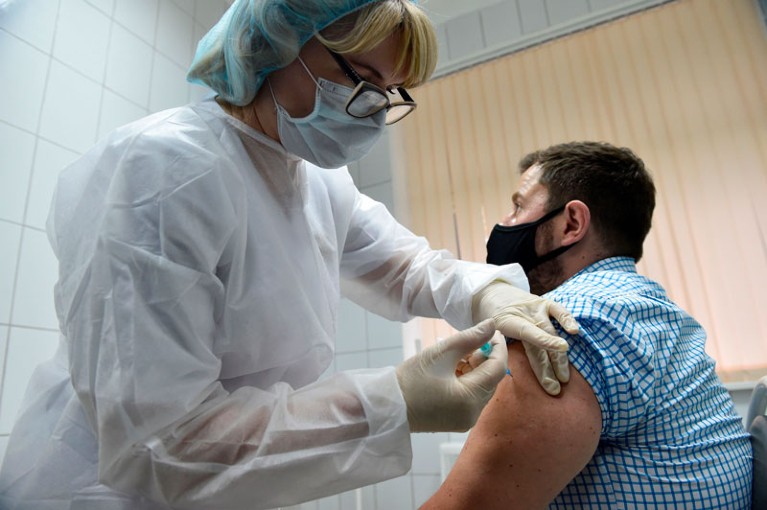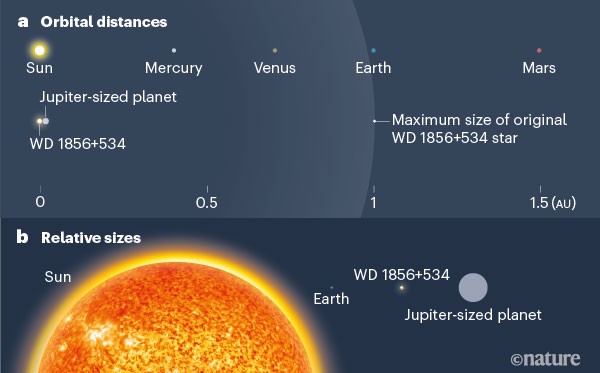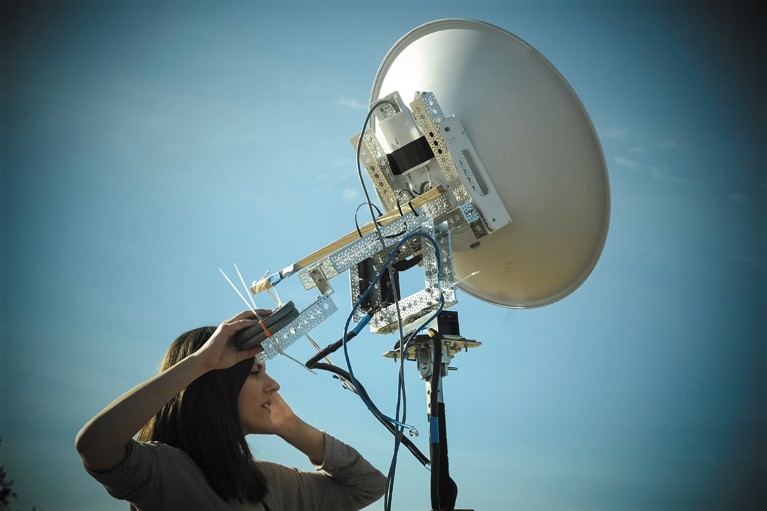Hello Nature readers, would you like to get this Briefing in your inbox free every day? Sign up here

Nations are making plans for how to allocate coronavirus vaccines once they’re proven safe and effective.Credit: Natalia Kolesnikova/AFP/Getty
COVID-vaccine access plans released
The World Health Organization has released a preliminary plan for globally allocating coronavirus vaccines when they become available. The report urges richer countries to ensure that poorer nations receive vaccines in the early days of allocation. The guidance follows a similar draft plan published by the US National Academies of Sciences, Engineering and Medicine (NASEM) earlier this month. The NASEM report recommends that health-care workers and first responders should be vaccinated first, followed by people with underlying conditions and older people and then essential service workers, such as teachers and grocery-store, transit and postal workers. People from hard-hit ethnic groups are over-represented in these jobs. “We really are trying to make sure that people of colour, who have been disproportionately impacted, will also have priority — but for the factors that put them at risk, not highlighting just their racial and ethnic makeup,” says co-chair of the NASEM committee Helene Gayle.
References: WHO report & NASEM report
Microscopy illuminates charcoal’s origins
Much of the charcoal sold in Europe comes from tropical forests and is often incorrectly labelled, raising questions about whether it was logged legally. The finding comes from an analysis of thousands of charcoal samples, using a pioneering microscopy technique. The opaque, multimillion-dollar international charcoal business in the European Union has come under fire because it is not covered by the legislation that prohibits illegally logged timber.
Reference: IAWA Journal paper
Features & opinion
Study of a lifetime
Long-term cohort studies are revolutionizing our understanding of the legacy of childhood experience for adult health and wealth. The longest-running examples even stretch into research on ageing and decline. In a new book, four leaders in the field share insights — and infectious enthusiasm — for their remarkable life-spanning projects.
Erno Rubik on his eponymous cube
Architecture professor Erno Rubik, who invented the Rubik’s Cube, has written a biography of his creation. “I don’t want to write an autobiography, because I am not interested in my life or sharing my life,” says Rubik. “The key reason I did it is to try to understand what’s happened and why it has happened. What is the real nature of the cube?”
The New York Times | 7 min read
Also well worth watching is ‘The Speed Cubers’, a short and surprisingly moving documentary about young cube-solving champions Max Park and Feliks Zemdegs.
‘I read a paper a day for 899 days’
Molecular biologist Olivia Rissland set herself the task of reading a different scientific paper every day for six months in 2018. The challenge not only helped her to keep up with research in her field, but also introduced her to methods and issues around ethics and systematic bias in science. “It’s made me a much more well-rounded scientist,” she says. Rissland found the challenge so rewarding that she’s kept it going, and in June this year she reached 899 papers in 899 days. She recommends the challenge to others. “I never would have imagined how much I would learn through this and how this would make me a better scientist and human.”
Mission Innovation is mission critical
A bold initiative to boost clean energy is working — despite not quite meeting its target of doubling global funding by 2020, write energy-policy researchers Zdenka Myslikova and Kelly Sims Gallagher. The ‘Mission Innovation’ initiative was formed in 2015 as part of the Paris Agreement by a group of 24 governments, including the European Union. Ahead of the final summit meeting on 23 September, Myslikova and Gallagher call for the initiative to be renewed, ramped up and refreshed to better integrate the private sector.
Podcast: Genes chart Vikings’ journeys
Researchers sequenced the genomes of 442 human remains found at archaeological sites across Europe and Greenland and uncovered distinct migrations during the influential Viking Age (around AD 750–1050). Danish Vikings headed for England, Swedish Vikings went east to the Baltics and Norwegian Vikings travelled to Ireland, Iceland and Greenland, while newcomers were also entering Scandinavia from the west. The genomes of four brothers from a Viking burial site in Estonia were linked to kin found hundreds of kilometres away, illustrating the mobility that characterized the age.
Nature Podcast | 25 min listen
Subscribe to the Nature Podcast on Apple Podcasts, Google Podcasts or Spotify.
News & views
Planet discovered transiting a dead star
Astronomers have observed a planet orbiting the burnt-out remnants of its home star — a white dwarf. The discovery proves that planets can somehow survive the death of their star, writes astronomer Steven Parsons. The planet is a big one — roughly the same size as Jupiter, or bigger — and might have been thrown towards the star by undetected planets in the same system.

Compared with the inner Solar System (below), the white-dwarf system (above) hugs its planet very tightly. The planet is roughly 20 times closer to the white dwarf than is Mercury to the Sun.
Where I work

Jessica Frantz is an undergraduate student in mechanical engineering at Arizona State University in Tempe.Credit: Arsh Nadkarni
“It might look like someone made it in their garage, but this instrument is a really powerful directional antenna,” says mechanical-engineering undergraduate Jessica Frantz. She and fellow students at Phoenix College in Arizona designed and built it for ASCEND, a NASA programme that funds science-education projects. “ASCEND is great because it is so hands-on — and it encourages women to speak up,” says Frantz. (Nature | 3 min read)
